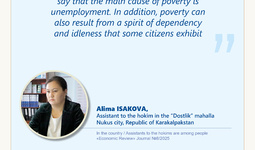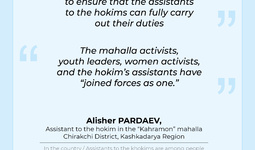– For the first time we talked last year, when the heading "Assistants to the khokims are among people" was opened. Almost a year and a half has passed since then. What changes have taken place in the mahalla during this time?
– There have been significant changes in our mahalla recently. Firstly, the infrastructure of our mahalla has improved in all areas. A number of new business entities were created, as a result of which the unemployed residents of the mahalla were provided with jobs and have a steady income. I will not be mistaken if I say that all these positive results are achieved thanks to the Mahallabay work system.
– Tell us about the results of your activities in 2023, what successes have been achieved in terms of employment of the unemployed, vocational training, support for entrepreneurship and the poor, and landscaping of mahallas. What do you consider the most important thing that was done for the society last year?
– In 2023, 168 citizens were employed in the mahalla. In particular, 113 of them were involved in permanent work, 55 in self-employment and 1 in paid community service. Also, within the framework of family entrepreneurship programs, 69 individuals and legal entities were allocated loans in the amount of 1,454.8 million sums. 54 members of 33 families were lifted out of poverty by creating "Individual Programs". In particular, 22 of them were provided with permanent jobs, 24 received preferential loans, and 8 people were sent to study in the fields of professions and entrepreneurship
In addition, one room was allocated in the mahalla building for the organization of sewing and weaving production, where more than 25 socially registered women received free vocational training, after which their employment was ensured. Last year, 8 women included in the "Women's Notebook" were allocated subsidies in the amount of 71.3 million sums for the purchase of tools.
Based on the decree of the President of the Republic of Uzbekistan dated July 13, 2023, No. PP-228 on the establishment of the Mahalla Support Fund under the Council of Ministers of the Republic of Karakalpakstan, the most basic infrastructure problems of the mahalla were solved at the expense of 500 million soums allocated during 2023. According to Resolution No. 500 of the Cabinet of Ministers of the Republic of Uzbekistan dated September 6, 2022, asphalt with a sand-gravel mixture was laid on internal roads with a length of 1.3 km. Also, on the basis of Government Decree No. 52 dated February 2, 2023, in order to assist mahalla families who found themselves in difficult housing conditions, the roofs of houses for 10 families were repaired. I think this is one of the most important areas of our work.
– Based on your experience as an assistant to the khokim, tell us, what are the main causes and factors causing poverty in your mahalla? What additional work do you think needs to be done to further reduce poverty in your region?
– The emergence of poverty is primarily due to the lack of a permanent job, lack of education, as well as knowledge and skills for doing business. Today, most of the poor families among the non-residents of the mahalla are families with people with disabilities, pensioners and women who take care of children. This situation also arises due to a lack of desire and understanding of how to start your business, for example, to get a preferential loan or subsidy.
The principle of "For human dignity" is at the heart of the reforms carried out by the State to reduce poverty. As an example, we can mention subsidies, financial assistance and preferential loans allocated to the unemployed and needy citizens. The existence of a system of free training for unemployed citizens in professions that are in high demand in the labor market is a positive action aimed at increasing employment and income of the population.
– In 2023, a number of resolutions were adopted concerning the activities of khokim's assistants. A rating of mahallas has been introduced, the practice of individual programs has been increased, the number of employees has been increased from 5 to 7, and councils for the development and support of mahallas have been created. What has been done in your region in connection with these regulations? To what extent have these regulations affected the effectiveness of activities?
– The number of employees of the mahalla office has increased from 5 to 7 at the expense of a tax officer and a social worker. More than 70 issues are being resolved in the mahalla itself, including those related to financial assistance and loans. The system is fully digitized.
New initiatives have been introduced in the mahalla to support the efforts of residents in this direction. A system of conducting conversations, studying and solving existing problems has been organized. Every week, information about the problems identified by the "five" mahallas, but not yet resolved, is transmitted to the relevant government agencies and organizations. Propaganda work on landscaping and landscaping is carried out during household rounds.
The Chairman of the mahalla was given the authority to involve the unemployed population in landscaping and seasonal work at the expense of the Public Works Fund. Information about vacant positions is provided to the mahalla by the district labor departments. The chairman of the mahalla selects and places the unemployed in his region. The tax inspectors of the district were also attached to the "five" mahallas. Now khokim's assistants are helping to promote the entrepreneurs' project, the tax inspector helps them as an accountant. Based on these changes, the role of the mahalla in solving problems on the ground was strengthened and the transition to the "seven mahallas" system was carried out.
It has not been long since such new specialists as the assistant to the khokim, women's activists and youth leaders began working in the mahallas. However, the result of their activities became noticeable after a short time. This is clearly evidenced by the fact that the population turns to the mahalla not for financial assistance, but more for the establishment of entrepreneurial activity, women and young people are increasingly aware of their rights and strive to effectively take advantage of the created conditions.
– What priorities have been identified for the development of the mahalla this year? What other plans do you have in this direction?
– According to the decree of the President of the Republic of Uzbekistan dated July 13, 2023, No. PP-228 on the establishment of the Mahalla Support Fund under the Council of Ministers of the Republic of Karakalpakstan, at the expense of 500 million soums allocated during 2023, a 3 kW solar panel worth 28 million sums was installed in the administrative building of "Markazobod" mahalla, as well as one PTZ camera worth 4.9 million sums. Also, a modern irrigation pump with a total cost of 24.9 million sums has been installed on the Bogep canal for irrigation of household plots. 30 night lights with solar panels worth 131.1 million sums have been installed on Alisher Navoi Street, at the intersection of Sh streets.Rashidov and Navoi installed a traffic light worth 69.9 million sums. In addition, a 900-meter-long overhead line was built from Tortkol Street to Beruni Street at a total cost of 91.6 million sums, and the chimes located in the center of Tortkol Street were repaired in the amount of 146.2 million sums.
In the future, it is planned to repair 1.6 km of internal roads and lay asphalt pavement. In addition, 0.5 km of drinking water pipes will be reconstructed, 94 old concrete blocks will be replaced with concrete blocks, SIP cables will be installed and transformers will be replaced due to low voltage electricity.
– Tell us in detail about the work carried out on the development of entrepreneurship in your mahalla? Give examples of successful entrepreneurial initiatives.
– During my work as an assistant to the khokim, 53 new enterprises have been created in the mahalla, 26 of them are individual entrepreneurs. By visiting newly established enterprises, regular contact with entrepreneurs, familiarizing them with existing opportunities, a systematic study of their current problems is carried out. For example, entrepreneur Muborak Saitova is engaged in hairdressing, cosmetology and other similar services. She has created 5 new jobs.
– Are there experienced entrepreneurs in the mahalla and how do you work with them? Can you give examples of this?
– Of course, we have such entrepreneurs. For example, Barno Khodzhieva, an experienced entrepreneur, produces confectionery and bakery products. There are many buyers for its products in neighboring areas, even in the Khorezm and Bukhara regions. Here, more than 20 girls have mastered the craft based on the "mentor-student" tradition and, thanks to the knowledge gained, they conduct their business activities. In order to widely disseminate the experience of successful mahalla entrepreneurs, systematic work was established with them.
– What is being done in the mahalla to support citizens working abroad and encourage their return to their homeland? What is being done to help them start their own business and successfully integrate into the local economy?
– 30 citizens working abroad have returned to their homeland. For our citizens who have returned from labor migration, all opportunities have been created to provide them with profitable work and open their own business. Two people were granted preferential loans in the amount of 53 million sums, and an opportunity was created for them to start their own business. Another 5 people are employed on a permanent basis, 9 people are currently in the informal sector — to legalize their activities, work is underway to register them as self-employed.
– What suggestions can you give to improve the activities of the khokim's assistants in Uzbekistan and increase the efficiency of their work?
– All the necessary conditions have been created for our activities. My suggestion is that if banks simplify the screening system when allocating preferential loans for business development, many new business entities will be created, the welfare of the population will increase, and budget revenues will increase.
– Are you satisfied with your work? What new goals and plans have you set for yourself in the near future?
– I am happy with my work. My goal is to solve the problems existing in the mahalla, while simultaneously raising the mahalla to a higher level of development by providing practical assistance to citizens.
Jamoliddin Turdimov, CERR
"Economic Review" Journal №7/2024





















leave a comment